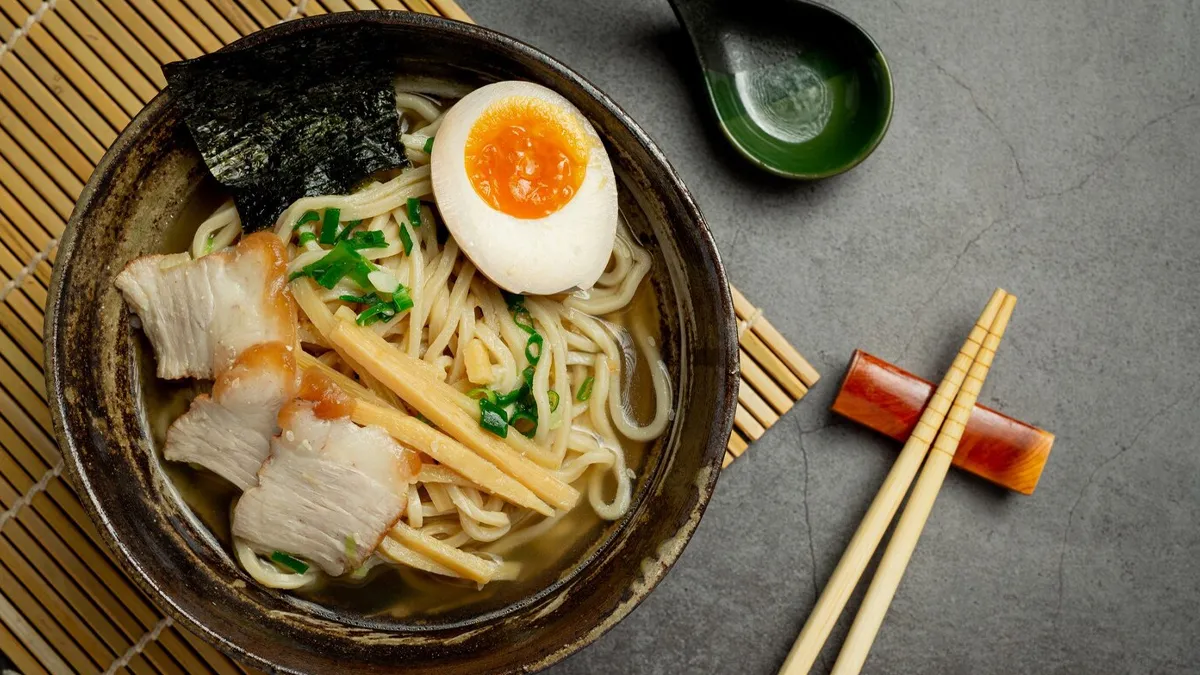
We all share a love-hate relationship with instant noodles. We are aware of its lack of potential side effects, but at times, we just can’t resist indulging in some piping hot comforting ramen bowl. But what if we tell you that a new study has linked ramen to high mortality rate risk? Yes, it indeed sounds shocking. Without making you wait any further, let us tell you all about it.
Table of Content:-
What Are Ramen Noodles?
Ramen is a Japanese noodle soup, which is popular worldwide. They are dried noodles, which are high in sodium and have no nutritional value. These noodles are made in different ways, but a classic bowl of ramen is the one which has a broth base, long thin wheat noodles, and various toppings.
Ramen Noodle Composition
Ramen noodles are commonly made of wheat flour, water, salt, and kansui – an alkaline mineral. Kansui gives the noodle its elasticity and chewiness. It also provides ramen with its yellow color. It is for this component that it is often believed ramen has egg as one of its ingredients, but they do not.
Do Ramen Have Nutrients?
According to USDA, one packet of ramen noodles (81g) consists of 14g of total fat and 6.58g of total saturated fat. This is around 33% of our daily recommended intake. Ramen is low in fiber, vitamins, minerals, and protein. They have almost no nutrition but many calories. To preserve ramen, tertiary-butyl hydroquinone (TBHQ) is used. It is a petroleum-based product that is hard to digest and is also found in pesticides and lacquers.
Also Read: Can Eating Raw Instant Noodles Kill? Exploring The Tragic Case of a 13-Year-Old Boy
What Is The New Study All About?
The joint research was conducted by universities in Japan ’s northeastern Yamagata prefecture. This region is known for some of the country’s highest ramen consumption. The study cites that those who eat ramen regularly face about 1.5 times the risk of death, compared to those who consume it once or twice a week.
The study was conducted on Yamagata prefecture’s 6,725 residents, who were aged 40 and above. It was carried out over a period of about four and a half years. Participants were split into four different groups on the basis of how often they eat ramen: fewer than once a month, once to three times a month, once or twice a week and three or more times a week. Researchers studied the relations between the frequency of ramen consumption and mortality risk.
Potential Side Effects Of Ramen
Consuming ramen noodles might lead to weight gain and obesity. On this note, let’s take a look at some of its other potential side effects:
Ramen Increases Risk of Metabolic Syndrome
Women are 68% more likely to develop a higher risk of metabolic syndrome if they eat ramen two or more times a week. The instant noodle’s processed ingredients, high sodium levels and excessive saturated fats are believed to contribute to high BP, sugar levels, and an increased risk of stroke, diabetes and heart disease.
Ramen Can Damage Your Liver
Highly processed foods can stress your liver because they are difficult to break down. The liver stores excess fat in its own cells when overwhelmed. This fat builds up and can inflame or damage the organ. Irregular liver function also leads to water retention and swelling.
Ramen Can Increase Your Risk of Heart Failure
Sodium causes high blood pressure, and may eventually lead to heart failure or stroke. Ramen contains 1,820 milligrams of sodium. This is almost two-thirds of the daily FDA-recommended consumption. This can increase your salt intake excessively.
Ramen Stresses Your Digestive Tract
Your stomach takes a long time to break down highly processed foods like noodles. This hinders natural digestion. Since ramen contains TBHQ, it further extends the time taken by your system to process the food. This may expose your body to this chemical for long and affects its ability to absorb nutrients from other foods.
Also Read: https://www.onlymyhealth.com/do-instant-noodles-impact-fertility-expert-shares-12977826783
How To Give Ramen A Healthy Twist
Ramen has a simple process of preparation. What’s even better is that you can add your own twist to it. So if you intend to make it healthy, then here are three ways to help you achieve that:
- Replace the sodium-rich seasoning packet with low-sodium chicken or bone broth.
- Add shredded chicken to pack your ramen with protein.
- Add chopped veggies like cabbage, carrots, mushrooms, and green onions.
- Add a boiled egg or tofu to get that extra punch of protein.
The Final Word
Ramen is a delicious comforting noodle bowl, which is popular worldwide. Due to its high sodium and TBHQ content, studies have often questioned its potential health risks. However, one can have ramen occasionally, and even give it a healthy twist by adding vegetables and protein to it.
Also watch this video
FAQ
Is ramen actually healthy?
No, traditional instant ramen is not healthy due to its high sodium content and lack of essential nutrients like fiber, vitamins, and minerals.Is ramen veg or non-veg?
Ramen can be either vegetarian or non-vegetarian. It depends on its broth, noodles, and toppings.Is Ramen Korean or Chinese?
Ramen is a Japanese adaptation of Chinese wheat noodle soups. It is first recorded to have appeared in Yokohama Chinatown in the early 20th century.Which noodles are used for ramen?
Ramen uses springy, golden wheat noodles. These noodles are different from other kinds you'll find in Asian cuisine due to the inclusion of kansui.
How we keep this article up to date:
We work with experts and keep a close eye on the latest in health and wellness. Whenever there is a new research or helpful information, we update our articles with accurate and useful advice.
Current Version
Oct 01, 2025 14:50 IST
Published By : Shruti Das
